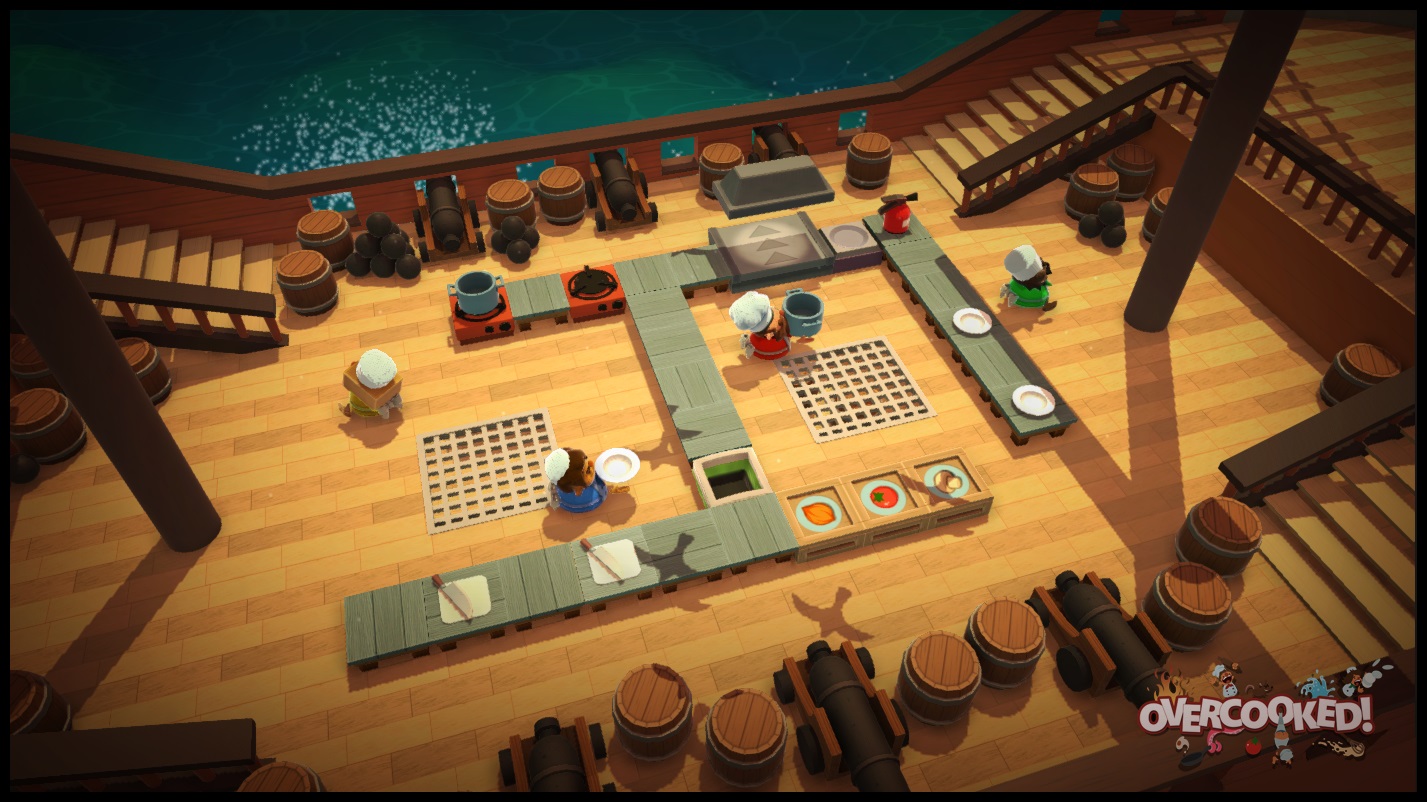Ghost Town Games' Overcooked starts with a simple premise: work together to fix meals in a restaurant. A couple levels in, however, that task becomes much harder as you and your friends will be sliding scross ice floes, fending off rats, or trying to fix a soup in the middle of an earthquake. We spoke with Phil Duncan about where the origination of this concept, the benefits of applying common knowledge to a video game, and an enthusiastic eight year old.
Co-Optimus: Thanks for talking with us about Overcooked! This is your first game as a two-man development team, but not the first game Oli and you have created. My first question is: why this game? Was this something dreamed up while you were at your former gig?
Phil Duncan: The idea for Overcooked came about quite naturally for us: Oli and I used to play a lot of multiplayer games when we worked together at Frontier and having grown up in a house with 3 brothers I've always been really into co-operative games. So we knew quite early on that we wanted to make a game people could play together but we also wanted to make a game which focused on the idea of genuine co-operation, one where a team's ability to work together was more important than the skills of the individual players.
We started thinking about situations in real life where people work together and where communication plays a big role and a kitchen just seemed like a pretty obvious fit for that (I've worked in kitchens in the past and I still remember the atmosphere, there was always such a great buzz and such a great sense of unity when you had this group of people all working against the clock, all falling over each other and yelling to make sure each meal went out on time, it was manic but it was really exciting).
With that in mind we built a rough prototype in unity with some friends and pretty quickly we had something that just seemed to strike a chord.
Co-Optimus: I've worked in a kitchen or two (mainly as part of the waiting staff) in my time and there's a definite hectic feeling the game captures well. Also, that's great it came from a love of co-op gaming! One of the interesting things I noticed with Overcooked when I was playing the demo was that it's very easy to get into it right away; there's no need for a lengthy tutorial or special menus to explain certain things. You have just a few buttons that do everything and the instructions of "chop, prepare, serve." Was this ease of access design intentional? Do you feel it's a key part of the co-op play?
Phil: That was definitely intentional on our part. One of the great things about making a game about cooking is that people come to it with a certain amount of pre-existing knowledge. Even if you can't cook, most people generally know how to make a burger or how to make a salad, which means we don't have to go through a lengthy process of teaching the player every part of the process with tutorials etc. (Which is especially important for a co-op game because you can be trying to teach 4 players at the same time when all they want to do is jump in and start playing).

The main reason for keeping the input simple is that it meant we could make the kitchens themselves and the interaction between the players much more complicated. As I mentioned earlier we wanted a big part of the game to be about communication and co-ordination between players; getting teams to talk to each other, to let each other know when a pot is about to boil over, or when a dish is ready to be served etc. which starts to happen much more when people aren't having to worry about the controls.
Another great consequence of this is that allows almost anyone to pick up the game really quickly, even people with little-to-no experience with games can quickly get to grips with the controls and join in. At conventions we've had hardcore gamers being yelled at by 8 year olds because they've not chopping the onions fast enough.
Co-Optimus: That's a very interesting design choice, i.e., giving any/all players a common pool of general/real world knowledge from which to draw and apply, and one the value of it seems to get overlooked sometimes. You mentioned that doing so allowed you to focus more on the interactions between the players as well as the environments. Those environments present the players with new challenges each time, like having to carry dishes over a moving ice floe or trying to keep rats from eating the food. How does that affect the communication between players?
Phil: Communication between players definitely changes as they advance through the game. Short hand terms arise and people find themselves falling into familiar roles. What's really fun for me is trying to keep the players on their toes, when players become accustomed to certain mechanics or methods, that when we try to introduce something new, something which provokes a new conversation. Even fairly simple mechanics can introduce a completely different play style: we added conveyor belts to the game and now suddenly there was this new element of time, players can't instantly pass items to one another, they need to coordinate their actions not only with each other but with the movement of the conveyor.
